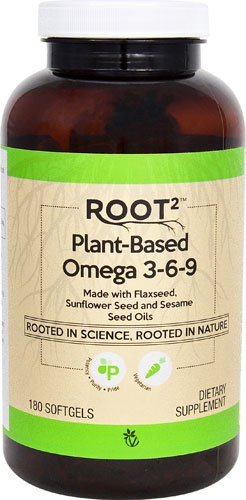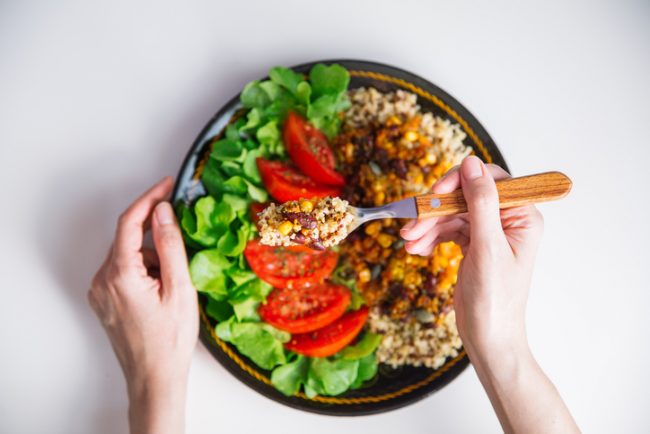Over the years I’ve been asked my fair share of questions related to plant-based nutrition.
I’ve had clients on grocery shopping tours show up with lab results in hand, asking me what foods they need to eat based on their numbers. “Quick” questions often turn into mini-nutrition sessions that result in discussing bowel movements and other not-so-glam bodily functions, which is always so much fun.
Since I get asked similar questions over and over again, I decided to compile the top 10 inquiries and answer them here—just for you (and your mom, dad, brother, sister, teacher, etc.)! Feel free to share this with your loved ones who are curious about a plant-based lifestyle.
If you have any additional questions about plant-based nutrition, feel free to leave them in the comments below.
1. What supplements do you recommend?
For my plant-based clients, I always suggest a vitamin D, vitamin B12 and omega-3 supplement as a standard foundation.
However, more supplements may be required based on an individual’s unique needs. I recommend talking to your healthcare provider to determine any nutrient deficiencies.
2. How can I get started following a plant-based diet?
Take small steps to achieve your overall goal. For some, this can mean eliminating meat consumption one day a week (it’s easy with Vitacost’s FREE Meatless Monday recipe book!). Others may be ready to remove meat and poultry entirely while still including fish.
Set goals that are realistic but push yourself outside of your comfort zone. Education is also key. Make sure to brush up on information from reliable sources, like those you’ll find mentioned below.
3. Is there an app for plant-based eating you can recommend?
Yes! My favorite app would have to be the “Daily Dozen” by Dr. Michael Greger, founder of nutritionfacts.org. This free app is a great roadmap for the basics of whole-food, plant-based eating. Dr. Greger shows you how many servings of foods you should be aiming for each day. You can track water consumption, daily exercise goals and how many servings of beans, grains, nuts, seeds, vegetables and fruits you consume daily.
4. Is there anything I need to watch out for when I transition to a plant-based diet?
Some of the biggest complaints I hear from clients include fatigue, having headaches and dealing with digestive issues. Typically, clients who complain about feeling tired or suffering from headaches simply weren’t eating enough calories!
It’s important to remember that plant foods tend to be lower calorie options, so portion restriction isn’t something to focus on. In fact I often increase client’s portion sizes to make sure they are getting enough calories.
And when it comes to digestive issues, going plant-based can mean a big increase in the amount of fiber you’re accustomed to getting. Fiber is one of the nutrients that keeps our bowel movements regular. To allow our bodies to get used to this high-fiber diet, slowly increasing plant foods can be the way to go.
5. What if I’m not ready to go 100% plant-based yet?
Who said you had to? Define the level of plant-based eating that makes you comfortable. At the end of the day, the important thing to keep in mind is that everyone can benefit from more vegetables in their diet. It’s not about aiming for perfection, but instead, improvement.
6. What books do you recommend?
There are so many! I usually narrow my response down to these top three picks:
- “How Not to Die,” by Dr. Michael Greger, which really breaks down the different food groups for plant-based eaters. Dr. Greger talks about the different disease states that are positively affected by a vegan diet.
- “Everything You Always Wanted to Know About Whole Foods but Were Afraid to Ask” by Chef Christina Pirello, M.S, which inspired me to fall in love with cooking. She includes several delicious recipes.
- “Becoming Vegan” by Brenda Davis, R.D. and Vesanto Melina, M.S., R.D has everything that you need to know about how to follow a balanced and healthy plant-based diet.
7. Can I really get everything I need from a plant-based diet?
Yes! Plants foods are true nutritional powerhouses. Full of vitamins, minerals, proteins, fats and carbohydrates, these foods are harvested from nature and are designed for us to eat.
There are a few nutrients we do need to be mindful of, like the supplements I mentioned above. But with a little a practice, you’ll be creating well-balanced, plant-based meals with ease and covering all of your nutritional bases!
8. Will I get enough protein on a plant-based diet?
Again, yes! For some reason we’ve been taught that meat is protein and beans, nuts and seeds aren’t held to the same “all-star” status. In actuality almost all foods except for oils have protein!
This means you can get protein from your fruit (i.e. an avocado) or from quinoa, black beans and even broccoli! In fact, as long as you’re eating enough calories, getting enough protein shouldn’t be an issue!
9. What does a plant-based diet look like?
A plant-based diet is a way of eating that’s centered on plant foods. This means focusing your meals around beans, whole grains, nuts, seeds, fruits and vegetables.
For those that need a bit more guidance as to the amounts of these foods, what a serving size looks like or what foods even belong to each food group, I’d highly suggest checking out Dr. Greger’s “Daily Dozen” app. It’s an amazing resource! Or, eliminate the guesswork entirely by following this 3-day vegan meal plan.
10. How can I save money on a plant-based diet?
For those worried about breaking the bank when going plant-based—let it be a nonissue.
Plant foods are some of the most inexpensive foods in the world (rice, beans, legumes, bananas, etc.). Sticking to a whole-foods way of eating—opposed to a diet rich in processed foods—will automatically result in savings.
Focus on purchasing dry bulk items that you can prepare from scratch rather than precooked or prepackaged items (did you know you pay a premium for the package wrapped around processed foods?). Buy frozen produce and opt for canned beans as a main protein source.
You can also start an herb/vegetable garden at home, shop at a local farmer’s market and choose to buy from Vitacost.com for even better deals on your favorite plant-based picks!




